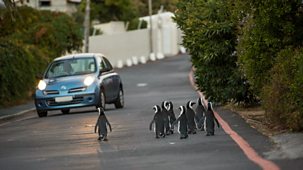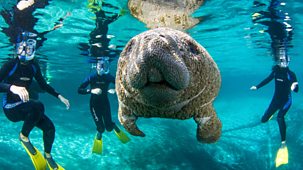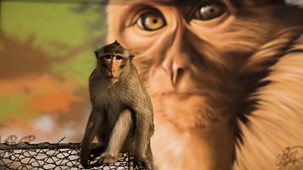
Series 1: 2. Commuters
More than a billion people around the world commute into cities each day, and they are not alone. The world's wildlife is commuting too. A steady flow of animals journey in and out of cities to find food and shelter or to start a family. Leaving the wilderness they must overcome the unique challenges that the urban world throws at them to benefit from the opportunities on offer. This episode explores whether the secret to an animal's success in this fast-changing world is to keep one foot in the wild and one in the city, becoming a wild commuter.\n\nIt seems that all over the world animals are finding that the city can offer opportunities that are harder to come by in the natural world. Some, like African penguins, whose population has plummeted by 80 per cent in the last 50 years, find shelter in the city. By nesting in Cape Town they are safer from predators, and with relatively easy access to their fishing grounds they have the best of both worlds. Many other animals commute into cities because they are filled with food. In St Lucia, South Africa, that includes hippos. Able to eat up to fifty kilograms of grass in a single sitting, they have developed a taste for the short, manicured lawns and come to town every night to dine out. St Lucia's human residents have learnt to give the hippos the space they need during their night-time raids. Black bears need to eat more than 20,000 calories a day to survive their six-month hibernation through winter, and using their acute sense of smell they can easily track down leftovers. In North America they come into towns and cities in search of food. \n\nMany animals displaced from their natural habitat are now using their wild skill set in the city to help fulfill their needs. Could this be the beginning of a new and very modern migration?
Source: BBC 2
Most recent episodes of Cities: Nature's New wild
Cities: Nature's New Wild
Series 1: 3. Outcasts
In the last 30 years the world's urban areas have almost tripled in size, changing at a rate wildlife has never experienced before. As cities are built, animals are pushed out o ...
16-02-2025
BBC 2
Cities: Nature's New Wild
Series 1: 2. Commuters
More than a billion people around the world commute into cities each day, and they are not alone. The world's wildlife is commuting too. A steady flow of animals journey in and ...
26-01-2025
BBC 2
Cities: Nature's New Wild
Series 1: 1. Residents
The world's cities are growing at a faster rate than any other habitat on the planet. And while most of us imagine them to be concrete jungles devoid of nature, for animals of a ...
05-01-2025
BBC 2
Most popular episodes of Cities: Nature's New wild
Cities: Nature's New Wild
Series 1: 1. Residents
The world's cities are growing at a faster rate than any other habitat on the planet. And while most of us imagine them to be concrete jungles devoid of nature, for animals of a ...
05-01-2025
BBC 2
Cities: Nature's New Wild
Series 1: 3. Outcasts
In the last 30 years the world's urban areas have almost tripled in size, changing at a rate wildlife has never experienced before. As cities are built, animals are pushed out o ...
16-02-2025
BBC 2
Cities: Nature's New Wild
Series 1: 2. Commuters
More than a billion people around the world commute into cities each day, and they are not alone. The world's wildlife is commuting too. A steady flow of animals journey in and ...
26-01-2025
BBC 2



